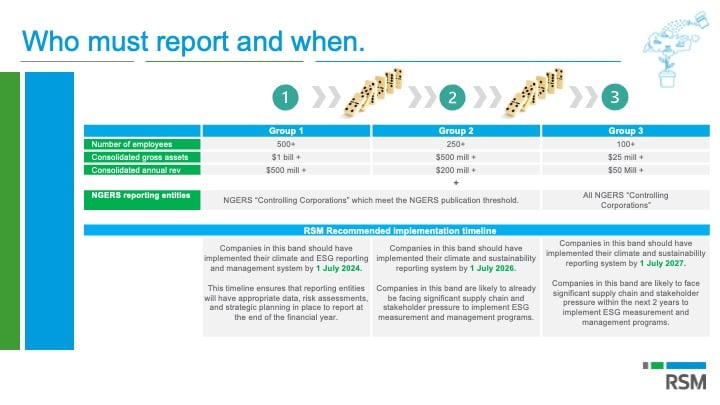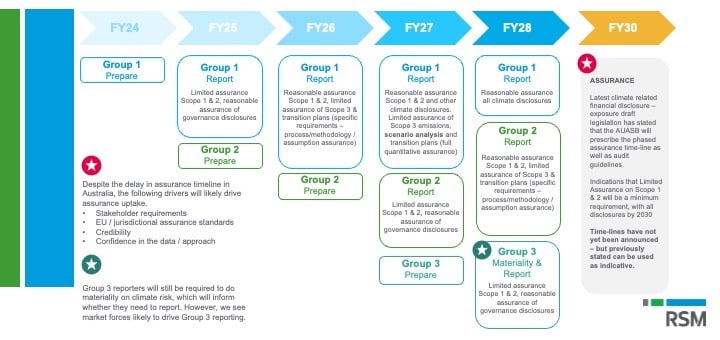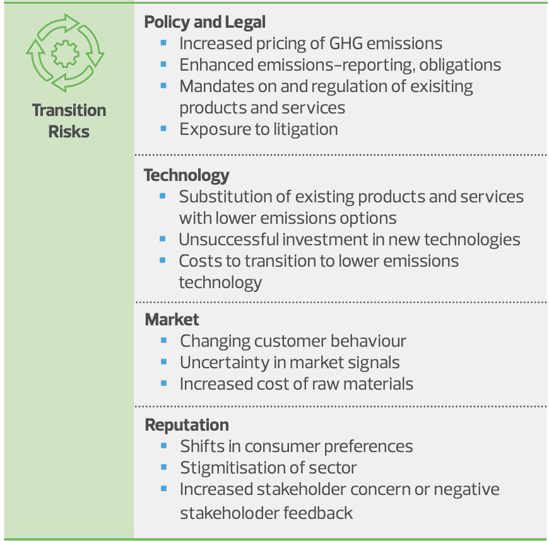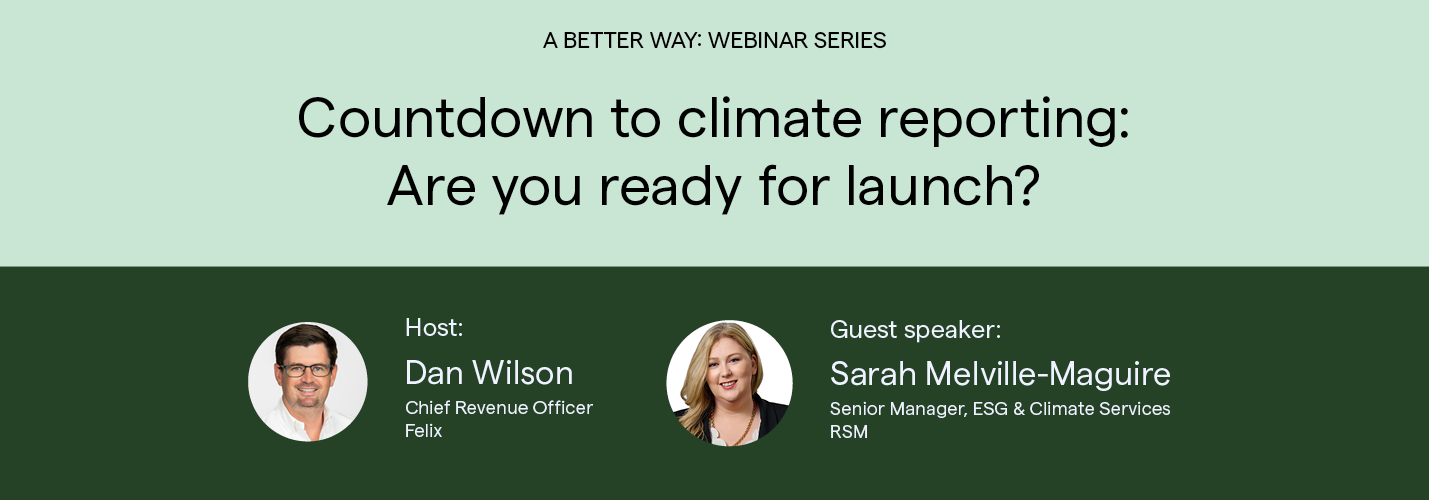Recently I had the pleasure of hosting a webinar on climate reporting with Sarah, a sustainability expert from RSM. She’s also the lead researcher of the report “From sustainability marketing to sustainability accounting” which assessed the readiness of Aussie companies for mandatory reporting.
Below are some of the questions that were asked during the webinar. We didn’t get to answer live all of the audience questions during the Q&A. However, if you do have any other questions, feel free to leave it in the comments section.
Watch the full webinar here.
On the responsibility of reporting
Q: I'm engaging a supplier that's in the Tier 3 or Group 3, perhaps that's relatively small and they don't need to report. They're bringing materials and people on the site. Is the onus then on the contractor or the asset owner that fits into Tier 1 who's engaging Tier 3 to report on that, or do they get a pass for the moment?
Sarah:
Functionally, you get a pass on supply chain carbon emissions for the first year. But one year is not a very long time when you're talking about the complexities of understanding the emissions of your suppliers.

These are emissions that you don't have direct control over. You don't have the ability to choose the exact type of fuel that goes into a truck that delivers things to your site, but it is something that those tier one businesses need to be aware of. So, while there is a year away, we are strongly recommending that businesses use that year to start understanding their supply chain and start requesting that emissions information from their suppliers.
We can estimate emissions from those suppliers if we can't get that information, but over time we expect that most of the supply chain will have to start reporting this information if they're not already.
Some of the big-name mining companies we've seen around town have been doing road shows to their suppliers and talking them through what their expectations are around disclosing emissions information and around setting decarbonisation targets.
And that's helpful if you're a business on the bigger end - to start engaging actively with your supply chain, start talking to them and helping them understand what it is that you need. Particularly, if they're a smaller supplier, this is quite a lot to take on, especially if they're coming from a base where they're not reporting any emissions now.
So definitely early engagement with supply chain is a huge activity that we recommend to any of those Group 1 reporters.
On the construction industry’s readiness to report
Q: You go to an industry event, and the construction industry talk about themselves being the biggest laggards when it comes to adopting new technology and being more innovative. As a whole, the industry is making great strides to improving in that area. But do you think that would have an impact on their ability to report and move closer to the other industries as they evolve?
Sarah:
I think we've got a stick and carrot situation here where there's always been, for 10 years or so in Australia, a bit of a “carrot” to start disclosing ESG information through that improved engagement with suppliers, preferential procurement.
But now we've got a “stick” as well where the Government is saying that you absolutely have to do this, otherwise you'll be facing fines. So, I think that alone is going to push every industry across the board towards this at a much faster rate.
Construction, for me, is quite a big concerning industry for the reasons that you've flagged. They do tend to be a bit slower in adopting these kinds of practices. But from the conversations that I've had with those in the construction industry, they do seem to be aware of this, and there is a genuine effort to progress towards it.

I think it's also happening really quickly. The pace at which this is being implemented in Australia is much faster than what's happening around the world. Even though other countries have adopted earlier, they did have a much longer lead time.
We have been talking about this in Australia for almost 18 months now, but the draft legislation was only released last month, and it is due to be put through Parliament as a Bill in May - it was on the agenda for a July 1 implementation.
That's a tight timeline for any kind of legislative or reporting change, but it's extremely tight for probably the most complex change in reporting in Australian history. I can't think of another time when there was such an enormous shift in what was required to be reported.
We've had a few little changes here and there with modern slavery and different ASX reporting requirements but as a holistic change for public and private companies, the enormity of this just cannot be understated, and that's why we just keep saying “prepare early”, “get ready” - have a go now when it's not mandatory reporting, when you don't need to release the results of your internal risk management processes so that you can troubleshoot all of those things in the business.
But I do think the construction industry is in for a little bit of a shock over the next 6 to 12 months. So, we'll see how that plays out.
---------------------------------------------------------------------------------------
Watch the full webinar here
On reporting as a competitive advantage
Q: We've seen some customers really embrace this as getting ahead of the curve and it is becoming a real competitive advantage when they're tendering on work, or whether it be with the government - say, “Hey, we've got such a good handle on this. Look at what we're doing. We're utilising this tool to engage our supply chain” - and have a really great understanding of what's happening on site.
Do you think that that is going to become the norm where if you don't have such a good handle on this, you become just uncompetitive in the market?
Sarah:
Absolutely. We're already seeing it. Just late last year I had coffee with somebody who runs a manufacturing business, and their annual revenue is around $25 million and one of the business owners was just absolutely devastated because on the basis of not being able to provide ESG information or being able to provide a competitive environmental and carbon based quote, they actually lost a major contract that was worth $5 million a year to that business.
So that's 25% of that business just completely undercut through an inability to respond to questions like “What are your carbon emissions? What are you planning to do about them? Do you understand climate risk?”, and that was absolutely devastating for that business.
The reality is, if all of your competitors start addressing these topics and have really robust responses that understand the interactions of climate risk with their business strategy, and they're able to respond to that better - then they're absolutely going to win out on contracts.
On the issue of resource constraints
Q: What would be your advice to a construction organisation that does not have a lot of resource to invest in this area? Some organisations have chief sustainability officers, while others just don't have that, and particularly in the supply chain, they don't have that same level of staff availability. How would you guide them around what can be done and how they can be doing this more efficiently whilst keeping their business running?
Sarah:
Yeah, it's a big challenge that has been recognised by the Government through consultations.
In January, Treasury released one of their consultation documents which was on an impact assessment to businesses, and there is widespread understanding that the skills and experience to undertake climate scenario analysis are not widely spread in the Australian market at the moment. There's not that many people that have significant experience in this space, even in large consulting firms, let alone in in-house companies.
So, the expectation from the Government is that this hole will be plugged by consultants and ideally that would be at a lower cost than going and hiring someone, because most of the organisations that we deal with particularly do actually already have chief sustainability officers. But the sheer breadth and depth of knowledge that's required from ESG, they're all such detailed topics in their own right as is climate, even though it's only a small part of the environmental impact.
Each of these requires an enormous amount of bespoke knowledge in that area and expecting to have a single person in a CSO role that can answer all those questions is just not realistic in my experience. The benefit from consultants in that scenario is that we do have quite a lot of people with quite a lot of varied experience that can answer different questions around this.
So unfortunately, in the short term, I think the answer is just using consultants to understand that risk and impact in the business. I very much hope in the long term, maybe even 3 to 5 years, that companies can build this kind of experience in house and build the abilities to do it, and we can do ourselves out of a job.
I think ongoing reliance on consultants flies in the face of sustainability, in my opinion, even though I am a consultant, of course. But I think it is inherent that we need to build these skills up in businesses. And if you're doing it right, it will happen anyway.
If you have a chief sustainability officer or a dedicated person in this business who's willing to sit in that process in detail and engage with it, you will build those skills in house. And then going forward, you can reduce that reliance, and that's also the expectation in the government consultations that have been released.
Also from a smaller, mid-tier business perspective, we recommend starting early and starting small. Start with the things that are achievable with the skills and experience that you have in the business, or with even just a small amount of consulting advice, and then you can build up from there.
Sometimes this takes a couple of goes to embed it and ensure that you have a strong enough understanding of it to go public. And that's why we're pushing organisations to get started as soon as possible, because July 1 is not very far away. And even the reporting that occurs at the end of that financial year is really close to when you start talking about these complex concepts.
On climate scenario analysis
Q: With the climate scenario analysis, there are plenty of estimates and forward-looking expectations involved. How do we ensure that we do not produce unrealistic analysis?
Sarah:
The reliability of forward-looking statements has always been a big conversation for those public entities. There's a lot of rules and regulations around what you can and can't say looking forward. And climate, because it is such a complex and interrelated issue, modelling it is not simple but what I would say is that there is an enormous amount of modelling out there.
Essentially what's happening in the background, and the science is there's thousands of physical based climate models that assess what's happening with the climate at any given time globally.
Those thousands of models are then put into what's called the IPCC - the Intergovernmental Panel for Climate Change - who release those assessment reports every 6 year-ish, and those are the big reports that everyone refers to for global climate modelling. But they're actually made up of thousands and thousands of climate models. And what they're doing is taking more or less an average of those models.
So, from a physical climate risk perspective, the data is extremely robust and relatively accurate, although again, any time you're trying to predict the future, there's always an element of uncertainty.
The other thing that I didn't talk too much about was transition climate models. When we talk about transitional risk and transition climate models, what we're really saying is: what are the non-physical impacts that could happen to my business?
 Transition risks. Source: RSM
Transition risks. Source: RSM
And that's things like the changing regulation that we're talking about today. This is a transitional risk for a business that needs to report under it, something that you need to be aware of. But there're bigger issues than that, like moving to renewable resources is probably the biggest one that's on people's minds.
The move away from fossil fuels and moving towards renewables could have an impact on your business depending on where your business is, and what type it is. If you're a fossil fuel company, that's a pretty obvious transition risk. But if you're in the renewable energy business, that's a huge opportunity for you as there’s more and more demand for renewable energy projects.
When we talk about these risks, there's a lot of modelling globally and nationally around what those impacts could be on a particular company or a particular industry. So, what your amazing climate team is doing in the background is understanding the specific risks for your business and going and selecting the transition models globally that apply most relevantly to your business and applying them to that scenario.
In terms of accuracy, predictions around climate transition are only as accurate as the underlying assumptions. There's also a lot of discussion through this process around what the assumptions are for your business, and how risk averse your business is.
When you're doing this, you're picking different climate scenarios, say 1.5 degrees of warming or 2 or 3 degrees of warming, and applying those transition scenarios to it. Then you can look at not just what's going to happen in the future from a transitional perspective, but what's going to happen under a 2.5 degree scenario, and that gives you a bit more of a robust understanding around what the transition risks are. As I mentioned earlier, the faster we transition to a low carbon economy, the lower the climate physical risks are, but the higher the transition risk.
So, when you're selecting that one and a half or 2.5 degree scenario, what you're doing is kind of normalising the physical climate risks that are occurring through that and looking at that specific transition scenario.
Essentially what that means is, if you're taking the appropriate risks and the appropriate opportunities and using good assumptions around the type of warming that you want to look at, you should be getting a reasonably helpful answer at the end.
----
Watch the full webinar recording for more details around reporting requirements.

Recent Articles
Buy vs build procurement software: Six key factors to consider before you decide
When it comes to procurement solutions, we are finding today that some organisations are at a crossroads: should they build a custom solution in-house or buy a ready-made platform that’s already proven in market? This decision matters most in a world where supply chains are complex, compliance demands are rising, and inefficient manual processes are no longer competitive.
Supplier Relationship Management: Top 10 Do's and Don'ts.
Supplier relationship management (SRM) is the backbone of a resilient supply chain. When procurement teams manage suppliers effectively, they reduce risk, improve performance, and streamline delivery across large project environments. Whether you are modernising your vendor management system or replacing manual spreadsheets, these essential do's and don'ts will help you strengthen your SRM strategy.
2025 in review: Milestones, insights and achievements
2025 – a year of that brought meaningful developments for Felix as we continue to address the evolving needs of organisations navigating complex supply-chain environments.
Let's stay in touch
Get the monthly dose of supply chain, procurement and technology insights with the Felix newsletter.






